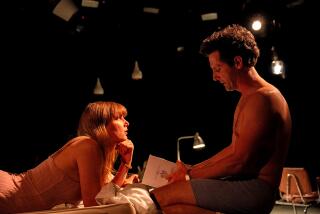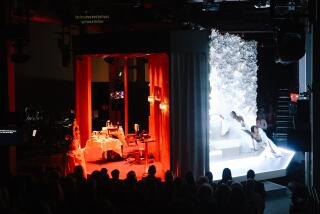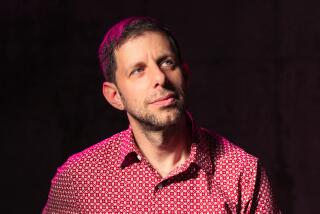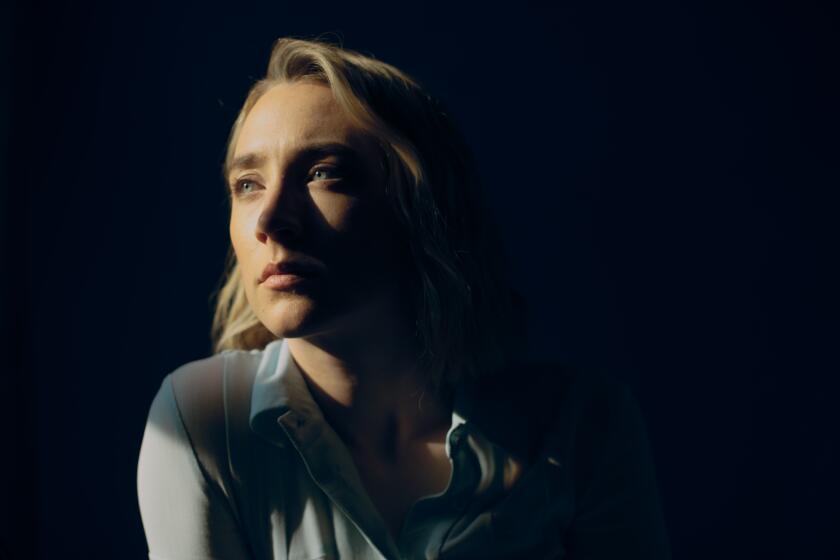Susan Graham experiences Dido’s hard life with a lounge lizard
Susan Graham and Nicholas McGegan have never collaborated before. But when they get together, the Texas-raised mezzo-soprano and British conductor behave like an old married couple. On a recent afternoon in Berkeley, the home base of the Philharmonia Baroque Orchestra, a leading period performance ensemble that McGegan has directed for many years, the duo engaged in lively banter about their first artistic partnership -- a six-concert California tour of works by the 17th century English composer Henry Purcell.
Graham is known as much for her pants roles in Baroque operas as for her championing of French and contemporary American song. Celebrating Purcell’s 350th birthday, the Baroque Orchestra’s “Passion of Dido” program features the versatile mezzo as the ill-fated heroine in “Dido and Aeneas” (1689). Joining Graham, McGegan, the orchestra and the Philharmonia Chorale are soloists William Berger, Cyndia Sieden, Céline Ricci, Jill Grove and Brian Thorsett.
Graham often performs in L.A, including headlining Los Angeles Opera’s 2006 production of Monteverdi’s “L’incoronazione di Poppea.” However, the singer’s visit Wednesday represents her first Disney Hall appearance. We caught up with Graham and McGegan during rehearsals to discuss, among other topics, the challenges of performing Purcell, Los Angeles music audiences and the correct way to pronounce “Purcell.”
You’ve known each other for years. What brings you together as collaborators now?
Susan Graham: I’ve always wanted to work with Nic. I’ve long been a fan of his musical aesthetic. I love this piece we’re doing together now.
Nicholas McGegan: And I always want to work with the best singers.
SG: Unfortunately, you got me instead.
NM: Ha-ha. Now you get to die six times on stage over the course of two weeks.
SG: I’m excited about that, as I don’t usually get to die -- or get the guy.
NM: Usually you are the guy.
SG: That’s true. In “Rosenkavalier,” which I did recently at the Met, I am the guy.
What’s the significance of performing “Dido” on Purcell’s 350th birthday?
NM: It makes me wish the composer had lived to 50 instead of dying at 34. Apparently his wife locked him out one night when he was late back from the pub. He caught a cold, and that was the end of him.
SG: Mrs. Purcell was a serious lady.
NM: Yes. Mind you, I don’t think Mr. Purcell was a first-time offender. He wrote about 50 drinking songs, most of which are unprintable.
Why do people respond to “Dido” so strongly today?
NM: “Dido” moves from comedy to tragedy so fast. It achieves in just 50 minutes what it takes most other operas three of four hours to do.
SG: Purcell wrote “Dido” for students at a girls’ school in London. Is it true or apocryphal that he composed the piece as an admonition to the young ladies -- as a warning to be wary of men, that they’ll break your heart and leave you to die?
NM: He mainly wrote it for money. But it’s true that Aeneas is an amazing lounge lizard.
How do you ensure that period performance is alive and vibrant?
NM: We don’t bring our treatises on stage. We simply focus on moving people. We’re entertainers. Certain academic ideas do matter. For example, if you’re going to perform a minuet, it helps to know how fast people danced minuets.
NM: Right. The period instrument thing is nice. But I’ve also performed “Dido” on modern instruments. I’ve even done it with Mark Morris dancing the role of Dido in a muumuu. It was quite beautiful.
SG: Morris is multitalented.
NM: But a femme fatale he is not.
SG: As much as he’d like to be.
Please talk about the work’s final famous aria -- “When I Am Laid in Earth.” How do you make this aria your own, Susan?
SG: By the time this aria occurs, it sings itself. The song is so loaded with everything that has come before, yet its purity is its driving force. All I have to do is sing it true.
What are the biggest challenges in performing “Dido”?
SG: There’s no place to hide. You don’t have a raucous orchestra disguising your flaws. You have under an hour to tell a huge story. Capturing big emotions in a tight time frame is hard.
What do you think about the way in which Purcell sets the story to music?
SG: There’s so much truth to Purcell’s vocal writing. Take the part where Dido and Aeneas sing this incredible battle duet. They’re playing a game of one-upmanship. He cuts her down. Then she mocks him and calls him a “deceitful crocodile.”
NM: No one but Purcell would use the word “crocodile” in an opera. There really are only three composers who set the English language well -- Purcell, Britten and Sullivan.
You’ve both been involved in notable recordings of this work before -- Susan under the baton of Emanuelle Haïm and Nicholas with Lorraine Hunt Lieberson. How do your past experiences inform your collaboration?
NM: I’ve got a completely blank score for this one, and I’m going to start all over again.
SG: Me too. I can’t tell you how many times I’ve had videos thrust at me in rehearsal and been told: “Do it like her!” Invariably, she’s a foot shorter than I am and I have bigger feet, so this approach doesn’t work. You always go into a new project wondering what the maestro is going to expect. We’re just the hired help, after all.
NM: She said with a grin.
SG: Everyone works within the circumstances of the specific production. The dynamics are always different.
NM: In this run of “Dido,” Performance One will be radically different from Performance Six.
SG: Things will get trillier.
NM: And faster.
SG: The witches will become sillier.
Please tell us about the other works in the program.
NM: We’re interested in showing Purcell’s range as a sacred and secular composer. The concert includes the joyful sacred anthem, “O Sing Unto the Lord a New Song,” Chacony in G minor, a misfit but lovely instrumental piece, the heart-wrenching sacred lament written for eight-part choir and organ “Hear My Prayer, O Lord,” and music that Purcell wrote for the 1695 revival of Aphra Behn’s grisly play, “Abdelazer.” Today, Purcell’s incidental music is better known than Behn’s drama, in which nearly everyone dies apart from the person responsible for lowering the curtain at the end. Many people know the “Rondeau” because Britten used it in his “Young Person’s Guide to the Orchestra.”
You’ve performed at Disney Hall before, Nicholas. But next Wednesday’s concert marks your premiere at the venue, Susan. What are your thoughts about the space?
SG: I’ve performed at the Dorothy Chandler Pavilion many times. As I’ve pulled into the parking lot, I’ve had an eye on Disney Hall and thought to myself, “I want to sing there.” I hear the acoustic is spectacular. For a piece like “Dido.” where clarity is an asset, it will sound brilliant. I’m hoping the space will help us play with lots of colors and textures.
NM: Disney is one of the world’s great concert halls. It’s a big space, but because of the steep rake of the seating, the audience never feels far away. I’ve done chamber music at Disney, and it’s felt intimate. I’ve also conducted the Los Angeles Philharmonic there, and we made a hell of a racket. The other great thing about the hall is the backstage area. It’s like a five-star hotel.
What do you think of L.A. audiences?
NM: I was recently in L.A. conducing an all-Mozart program at the Hollywood Bowl. I like Bowl audiences because they don’t behave like they’ve been recently starched.
SG: L.A. audiences aren’t afraid to be surprised. For example, they loved “The Coronation of Poppea.”
Please, can you settle the confusion about how to pronounce the composer’s name?
NM: For some reason, people often mispronounce Purcell’s name. It’s “PUR-cell.” It should rhyme with “rehEARsal”.
SG: It’s not supposed to rhyme with “DuraCELL” or “PurELL.”
More to Read
The biggest entertainment stories
Get our big stories about Hollywood, film, television, music, arts, culture and more right in your inbox as soon as they publish.
You may occasionally receive promotional content from the Los Angeles Times.










